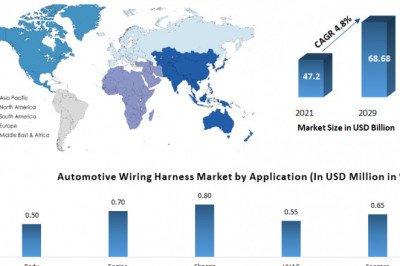
views
Market Overview
As per the latest report furnished by Market Research Future (MRFR), the global Biochips Market Size held the value of USD 7,300 million in 2017, with the growth rate of the market predicted at 11.6% over the forecast period (2022-2030).
Growth Drivers and Challenges
Microfluidics and Microarray technology have revolutionized the field of scientific research by reducing costs as well as time required for conventional laboratory-based approach of research. Microfluidics provide various benefits like reduced assay costs owing to need for less amount of sample in nano-liter or pico liter volume, increased sensitivity, accuracy, and throughput as compared to traditional laboratory procedures and also reduced labor cost. The products that are based on DNA microarrays, lab-on-a-chip, protein chips, as well as organ-on-a-chip technologies have managed to alleviate the existing problems associated with time and costs in their respective fields. Also, the research and development activities are underway at present, regarding the microarray and microfluidic technologies for numerous applications. This factor will turn out to be a high point for the market growth in the coming years. For instance, in the year 2017, Griffith Institute for Drug Discovery (GRIDD) started the process of developing microfluidic platform to further decrease time and costs needed for research.
To sum it up, extensive research and development in the field is expected to eventually elevate the adoption rate of these technologies. Case in point is the successful demonstration by scientists at Harvard University, which used the paper and threads as an ideal option for cheap microfluidic devices. moreover, integrating electrodes and electrical textile valves into such devices will make it even more useful.
Going forward, the Laboratory of Integrated Bio Medical/Nanotechnology & Applications at the University of Illinois went on to develop a microfluidic POC sepsis chip that has the ability to quantify the total white blood cell counts and CD64 expression levels on neutrophils in just 30 minutes. This was done by using just 10 microliters of a blood sample. As per the National Center for Biotechnology Information (NCBI), a microfluidic biochip is capable of isolating single circulating tumor cells, delivering personalized medicine in non-small cell lung cancer patients. The sum of all these factors, including various research and development activities along with the benefits offered by this technology, will prove to be highly beneficial for the Biochips Market size growth in the near future.
Request Free Sample Copy at:
https://www.marketresearchfuture.com/sample_request/7063
Market Segmentation
The global biochips market is segmented based on type, technology, and end user.
Type-based segments in the global market include DNA chips, lab-on-a-chip, protein chips, cell arrays, and tissue arrays. DNA chips is sub-segmented into gene expression, SNP genotyping, cancer diagnosis & treatment, genomics, drug discovery, agricultural biotechnology, and others. Furthermore, lab-on-a-chip is further divided into clinical diagnostics, genomics, IVD (In-Vitro Diagnostic) & POC (Point of care), Proteomics, Drug Discovery, and others. In addition, protein chips consist of proteomics, expression profiling, diagnostics, high-throughput screening, drug discovery, others.
On the basis of technology, the market is segmented into microarrays and microfluidics.
The end users in the Biochips Market size are biotechnology and pharmaceutical companies, hospitals and diagnostics centers, academic & research institutes, and others.
Key Players
GE Healthcare, Bio-Rad Laboratories Inc., Cepheid Inc., Agilent Technologies, Inc., Perkinelmer Inc., Fluidigm Corporation, Illumina, Inc., Thermo Fisher Scientific, Inc, Roche Diagnostics, Abbott Laboratories, are some of the established companies competing in the global biochips market.
Browse Detailed TOC with COVID-19 Impact Analysis at:
https://www.marketresearchfuture.com/reports/biochips-market-7063
Regional Analysis
Regionally, the global biochips market is split into the key regions of Europe, Asia Pacific, the Americas, along with the Middle East & Africa.
The biochips market, in the Americas, is flourishing in the regions of North America and South America, wherein the North America market is further split into the United States (US) and Canada. The humongous share belonging to the region can be credited to the expanding geriatric population; growing prevalence of lifestyle diseases like asthma, diabetes, and cardiac disorders; increasing adoption of biochips; and a substantial number of ongoing research activities and discoveries taking place related to biochips.
The Europe Biochips Market size is divided into Western Europe and Eastern Europe. The Western Europe biochips market is spread across the countries of France, Germany, the United Kingdom (UK), Spain, Italy, and the rest of Western Europe.
The biochips market in Asia Pacific is thriving in the countries like India, China, Japan, Australia, South Korea, and the rest of Asia Pacific. Easy access to modern and latest technologies along with growing government initiatives and cost advantage of the technology is set to benefit the regional market to a large extent.
Lastly, the biochips market in the Middle East & Africa has is spread across the main regions of Middle East and Africa.
Recent News
January 2019 – Swiss scientists have made use of a lab-on-a-chip device for the diagnosis of the neurodegenerative condition i.e. Huntington’s disease, derived from DNA in the blood in just five minutes. This will help predict if the patient has Huntington’s as one region of the gene is mutated, including various repeated code which will make it longer in length compared to the healthy gene.
At Market Research Future (MRFR), we enable our customers to unravel the complexity of various industries through our Cooked Research Report (CRR), Half-Cooked Research Reports (HCRR), & Consulting Services. MRFR team have supreme objective to provide the optimum quality market research and intelligence services to our clients.
Contact us:
Market Research Future (part of Wantstats Research and Media Private Limited),
99 Hudson Street, 5Th Floor,
New York, New York 10013
United States of America
+1 628 258 0071
Email: sales@marketresearchfuture.com












Comments
0 comment